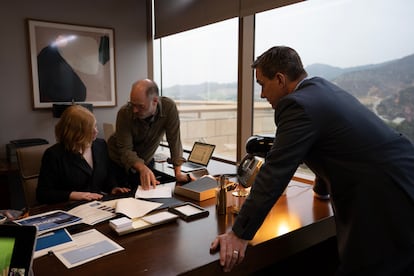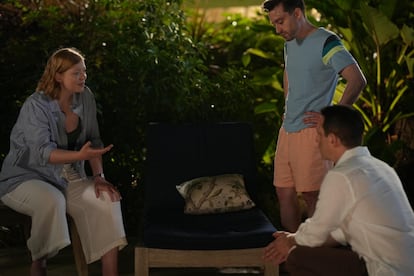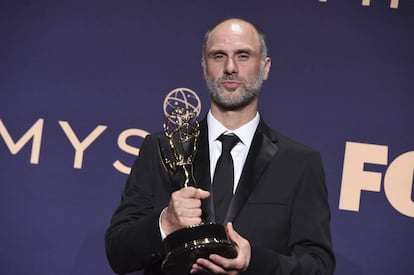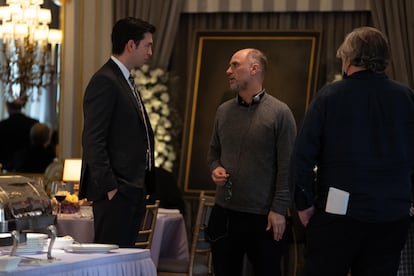Jesse Armstrong, creator of ‘Succession’: ‘We could tell stories about the characters forever, but the business story had to end’
The screenwriter explains how Brexit and Donald Trump helped shape the HBO series, and the reasons behind the decision to end it after its fourth season

Logan Roy’s media empire has an heir. Succession, one of the most acclaimed and awarded series of recent years, brought its storylines to an end last Sunday, May 28. Jesse Armstrong watched its last episode surrounded by other screenwriters at London’s British Film Institute: “It was very sad and very happy and fun to do that,” he says. He had known for a long time how the story would end. The creator, with a long history in comedy and satire – a genre that he perfected in the HBO series – said goodbye to a show that critics placed high on a pedestal. Later, barely 48 hours after the finale aired, he spoke to EL PAÍS in a long video call from his home in London and, something quite unusual, without anyone from the network present. Of course, this interview contains spoilers of the ending.
Question. Why did you decide to end the series in the fourth season? Was there nowhere else for Roys to go?
Answer. I think probably we could keep telling psychologically interesting stories about the characters. The show has two tracks, right? The personal, psychological, familial, and the kind of business, political, cultural. And we should be able to carry on telling interesting stories forever about the psychology of the characters. But the business story had to come to an end. Although I’m more interested in human psychology than I am in business, once that story was finished, the show would not be interesting enough to carry on. Once that trajectory finished, once the business was dissolved, then the show should stop. Maybe we could have made the business story go on with some more changes and machinations and tactics, but it could start to feel repetitive and I never wanted that to happen.
Q. When did you decide how the show would end?
A. The way I work as the so-called showrunner, or head of the writers room, is to bring a proposition. But because I respect my colleagues and I want things to be open, it’s not that definitive. I started making the proposition a long time ago, maybe 2021, when we were making season three. I started to sketch out the shape of this season, which would have Logan die early on and then we would end. I was always open to having my mind changed, but it became more and more solid.

Q. And why did it have to be Tom who came out on top?
A. After some business observations about the kind of people who prosper, sometimes you have these kinds of people who start big companies, and then you have the people who a generation later, or two generations later, filter up through the organization and make themselves amenable to power and useful to the powerful people. We weren’t looking for a Lenin again, which was maybe your Logan Roy – well, this would be very unkind to Tom, but we wanted more of a Stalin who would see his way through the rival factions in the wake of the death of the buccaneering founder.
Q. When did the actors find out how the series would end?
A. When we began the season, I told everyone: “Look, I think this is the last one for me and my fellow writers. We need room for maneuver and it’s possible not, but I think this is it.” So they knew it was probable, but it wasn’t definite until the end, because I always wanted to keep it alive and open to possibility. So it was hopefully not too much of a shock. But it was a revelation; the mechanics of how Tom would get seduced by Mattson and these details were a surprise. I told Matthew Macfadyen, who plays Tom, from quite a long time ago, back in season two and three, that although there’s a comic edge to him, I always used to try to remind him: “It could still be you, remember to keep that part of you which is a steely cold operator.” So hopefully he always knew that this might be the end.
Q. Some series shoot alternative endings to avoid leaks. Did you do something like that?
A. No, no. We didn’t do any alternative endings. When we shot the very last scene of Jeremy [Strong, who plays Kendall] down in Battery Park, on the tip of New York, looking at Ellis Island, he did a very violent piece of improvisation, which was to jump over the barrier. None of us were expecting it, so it was quite scary. But Scott Nicholson, who plays his bodyguard, jumped over to it and put his arms on him. It was scary and felt very real, and true to what Jeremy was feeling about the character. But the show ends where I think it should end.
Q. Early in the final season you shocked with the death of Logan Roy [Brian Cox]. Why did you decide that it had to happen on the third episode? Did you ever regret that decision?
A. No. I mean, it was a dangerous creative idea because he was so brilliant and he’s the center of the show. And to take that piece out, there’s a worry; will this machine still work if you take out the biggest cog from the middle of it? I think it was the right decision because in a way I think it honored how central he was, to see how the world worked without him. If we’d only seen one episode of what it was like without him, you wouldn’t have felt how profoundly he was missed. It was hard to tell Brian Cox, who I so admire and is such a big figure in British theater and television and film. It was a little intimidating to tell him.

Q. It’s hard to warm up to characters as hateful as the leads in Succession, but as a writer, you have to make the audience care about them. How did you handle that contradiction?
A. There’s no trick. It’s simply that, although they do things that you could call immoral, or they make decisions which have bad effects in the world, that’s part of the show, to show why that might happen, why individuals might make those decisions, why they might act the way they do. We start to understand people when we see enough of them, right? And you can go, “Okay, I understand you, but I still don’t like you.” So there’s no trick. It’s just trying to show a whole person. Maybe when you see the whole person, you understand them more and you become less coldly judgmental and a little more warmly understanding.
Q. You have said that Brexit and Donald Trump are at the heart of Succession. In what sense?
A. There’s the psychological level to the show, and then there’s a cultural, political, business level. And I love these characters, and they’re probably the thing which makes me want to write the most, but they are significant because of their media and political influence, and the rise of national populism, you know, in the UK we saw its most violent effect with Brexit and in the US with Trump. How did this happen? What media environment encourages it or fails to check it or debunk it or profits from it?
Q. You have cited three role models as inspirations for Logan Roy: the three media moguls Rupert Murdoch [Fox News], Sumner Redstone [ViacomCBS] and Robert Maxwell [Maxwell Communications Corporation and Mirror Group Newspapers]. What did you take from each?
A. Those are the primary ones, but there are others floating around. There’s Trump, Berlusconi, Vivendi in France, Grupo Planeta in Spain... There are lots of people who you can think about, these family media empires. So what did I take from them? Logan is an immigrant and Maxwell was born in the Czech Republic. Redstone is a very bright lawyer, rather brilliant; Murdoch is also intellectually smart, and he has these very strong gut political instincts, but it also makes him amenable to power. It was a mixture. It’s difficult to pick out the individual threads which went into the composite.

Q. In addition to these original references, did you pay any attention to the news for the plots of Succession? I’m thinking of, for example, Elon Musk.
A. Yes. There is a lot of media consolidation going on from old media companies, in the face of all the money that has come from technology companies. We have an example of that in our show; it follows pretty precisely what has happened in traditional media. It was always a story about the end of a media empire. And, you know, reading The Wall Street Journal and the Financial Times has been very important to getting the plot right. If you read those things, I think you would have been able to predict what happened, certainly on a business level.
Q. Succession took a leap in popularity and awards when it entered its second season. What gave you that push that made you connect with people? What do you think happened?
A. I don’t know. This is a question for you. If I if I knew, I would have done it in the first season. Little bit of time. Maybe the momentum of the business story increased. I don’t know. Maybe we got better, but it’s hard for me to see.
Q. You have said that you made between 30 and 50 draft scripts for one episode. At what point do you know that the script is finished?
A. When the director says, “Tomorrow we start shooting.” [Laughs] We write a lot of drafts but, you know, when we’re writing draft 40 or something, 90% of the script is locked. In those last ten drafts we’re looking at one set, one scene or one section, one piece. It’s just that we do a lot of drafts to get everything, I hope, right and funny and tight, and that every line tells you lots of information about these characters.

Q. It is almost commonplace to describe Succession as a Shakespearean drama. What do you think when you hear that comparison, that description?
A. It makes me blush and I feel honored. The pitch for the show was “Festen meets Dallas.” Dallas was a TV show, a sort of soap opera in the 1970s and 1980s, and Festen is the Danish Dogma film. We took inspiration from lots of places, and certainly I was aware that when you’re writing about Roys, kings and princes and successions, there’s a lot to draw from in Shakespeare.
Q. I guess it is like asking you to choose between your children, but maybe now that you’ve wrapped up the show you can tell me which Roy was your favorite.
A. [laughs] I cannot say, it’s true. If I was writing a Roman scene, I loved Roman. If I was writing a Shiv scene, I loved Shiv. I mean, sometimes Roman would do despicable things, make very bad decisions, but I enjoyed writing it, and I felt I knew him. Hopefully that’s why the show is interesting. I was interested in every single character in the show.
Q. As a writer, is it easy to say goodbye to a show you devoted so much time to?
A. I was going to say no, but I don’t feel that today. What I feel a little bit, I guess, is an anxiety about making something complete. I don’t know whether people will think this is the right ending, but I feel it’s the right ending and I think it makes the show complete. And so, although I’m very sad to say goodbye to my fellow actors and my writers, I no longer have this anxiety, which is like, “Okay, I think we’ve made something good, but can we complete it correctly and satisfyingly?” And I’m not sure if that won’t be the case for everyone in the world. People will have different views about who should have won, or what the real version in the media world landscape should have been. But I feel satisfied that we did an honorable job and we finished it.
Q. There is speculation about possible sequels or spin-offs of the series. Is there any possibility of continuing it?
A. No, no, no. I think once I said that I could imagine a story in the world of politics, or something else, that is in the same world that the Roys existed in. But that’s not a spin-off. I like this tone and I like the fictional world. But these characters, I think, sadly, we’ve said goodbye to them forever.

Q. Have you imagined what the lives of the Roys and those close to them will be like after the end?
A. I feel a great deal of empathy and interest in them, but sadly I think that once they’re no longer involved with the power of their media family, to me, they’re like people you met at a party who seemed to be very rich or powerful, but I’m no longer fascinated by the details of their lives. So I can imagine roughly what the life of a playboy, a cold hearted, rather broken man like Roman would be. But I’m no longer interested in the details. That that goes for Kendall, too.
Q. What are your plans now? Do you have more series or movies in mind?
A. I have little ideas. I have my notebooks, but I mainly I want to not do anything and try to think very, very slowly. Also, I’m on strike at the moment. But when I think about creative things, I’m trying to not make any big decisions fast. I’m trying to take a big rest.
Sign up for our weekly newsletter to get more English-language news coverage from EL PAÍS USA Edition
Tu suscripción se está usando en otro dispositivo
¿Quieres añadir otro usuario a tu suscripción?
Si continúas leyendo en este dispositivo, no se podrá leer en el otro.
FlechaTu suscripción se está usando en otro dispositivo y solo puedes acceder a EL PAÍS desde un dispositivo a la vez.
Si quieres compartir tu cuenta, cambia tu suscripción a la modalidad Premium, así podrás añadir otro usuario. Cada uno accederá con su propia cuenta de email, lo que os permitirá personalizar vuestra experiencia en EL PAÍS.
¿Tienes una suscripción de empresa? Accede aquí para contratar más cuentas.
En el caso de no saber quién está usando tu cuenta, te recomendamos cambiar tu contraseña aquí.
Si decides continuar compartiendo tu cuenta, este mensaje se mostrará en tu dispositivo y en el de la otra persona que está usando tu cuenta de forma indefinida, afectando a tu experiencia de lectura. Puedes consultar aquí los términos y condiciones de la suscripción digital.









































